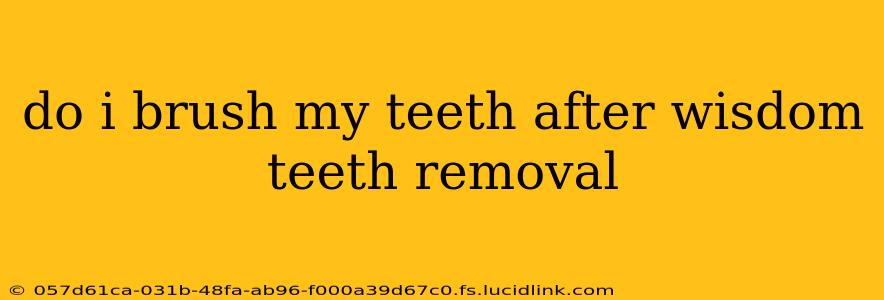Do I Brush My Teeth After Wisdom Teeth Removal? A Comprehensive Guide
The question of whether or not to brush your teeth after wisdom teeth removal is a common one, and the answer is a bit more nuanced than a simple yes or no. While maintaining good oral hygiene is crucial for healing, the immediate post-operative period requires a gentler approach to avoid disturbing the extraction sites.
The short answer is: Yes, but with caution and specific techniques.
Immediately following wisdom teeth removal, you'll likely be numb and experience bleeding and swelling. This makes vigorous brushing inadvisable. However, neglecting oral hygiene altogether can lead to infection and hinder healing. Therefore, a modified brushing routine is essential.
When Can I Start Brushing After Wisdom Teeth Removal?
The best time to resume brushing is typically 24 hours after surgery, provided the bleeding has stopped or significantly reduced. Always follow your oral surgeon's or dentist's specific instructions, as recovery times can vary.
How Should I Brush After Wisdom Teeth Removal?
Gentle is the name of the game. Here's a step-by-step guide:
-
Soft-Bristled Brush: Use a soft-bristled toothbrush to minimize irritation. Avoid hard-bristled brushes, which can disrupt the blood clots forming in the extraction sites.
-
Gentle Movements: Brush gently and avoid the extraction sites directly. Focus on the remaining teeth, using small, circular motions.
-
Rinse Gently: Rinse your mouth gently with saltwater (1/4 teaspoon salt in 8 ounces of warm water) after brushing. Avoid swishing vigorously, as this can dislodge blood clots.
-
Avoid the Extraction Sites: Completely avoid brushing or touching the extraction sites with your toothbrush for at least the first 24-48 hours.
-
Frequency: Brush twice a day, as you normally would, but focus on gentle techniques.
What if I'm Still Bleeding?
If you're still experiencing significant bleeding, postpone brushing until the bleeding subsides. Gentle rinsing with saltwater is usually acceptable, but always consult your dentist or surgeon if you have any concerns.
What About Flossing?
Similar to brushing, avoid flossing near the extraction sites for at least the first few days. Once your surgeon gives the okay, you can gently floss around the other teeth, being careful not to disturb the healing areas.
What are the Signs of an Infection After Wisdom Teeth Removal?
Knowing the signs of infection is crucial. Contact your dentist or surgeon immediately if you experience:
- Increased pain or swelling: Beyond the expected post-operative discomfort.
- Excessive bleeding: Bleeding that doesn't stop or significantly reduces after a few hours.
- Fever: A temperature above 100.4°F (38°C).
- Pus: White or yellowish discharge from the extraction sites.
- Bad breath: Persistent foul odor, which could indicate infection.
Can I Use Mouthwash After Wisdom Teeth Removal?
Using mouthwash immediately after surgery is typically discouraged as it can interfere with healing. Your dentist might recommend a specific antimicrobial mouthwash after a few days once the extraction sites have started to heal. Always follow their instructions.
By following these guidelines, you can maintain good oral hygiene while allowing your extraction sites to heal properly. Remember, prevention is key; prompt attention to any complications will help ensure a smooth and swift recovery. Always prioritize communication with your dental professional for personalized advice tailored to your specific situation.
